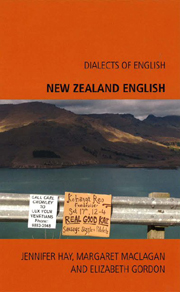Book contents
- Frontmatter
- Contents
- Preface
- Maps
- 1 Geography, Demography and Cultural Factors
- 2 Phonetics and Phonology
- 3 Morphosyntax
- 4 New Zealand Vocabulary and Discourse Features
- 5 The Origins of New Zealand English
- 6 Variation within New Zealand
- 7 Selected Bibliography of Works on New Zealand English
- 8 Sample Texts
- Bibliography of Cited Works
- Index
3 - Morphosyntax
Published online by Cambridge University Press: 12 September 2012
- Frontmatter
- Contents
- Preface
- Maps
- 1 Geography, Demography and Cultural Factors
- 2 Phonetics and Phonology
- 3 Morphosyntax
- 4 New Zealand Vocabulary and Discourse Features
- 5 The Origins of New Zealand English
- 6 Variation within New Zealand
- 7 Selected Bibliography of Works on New Zealand English
- 8 Sample Texts
- Bibliography of Cited Works
- Index
Summary
The previous chapter focused on the sounds of New Zealand English – which together make up the New Zealand accent. Descriptions of the unique features of New Zealand English almost always focus on accent. One reason for this is that there are a large number of very salient differences between the sounds of New Zealand English and the sounds of other dialects of English – differences which can be very obvious to listeners. Of course it is not just New Zealand English that is most identifiable by its unique accent. Whenever we meet someone from some other part of the world, we tend to notice their accent before we notice any unusual words or phrases that they might use.
Much more research has been done on the ways that New Zealanders pronounce words than on the ways in which they organise them into sentences. This is not only because pronunciation is so salient, but also because there are actually relatively few syntactic features that are wholly unique to New Zealand. Like all other varieties of English, New Zealanders vary in the syntactic constructions that they use, and there is some social stigma associated with features which are regarded as non-standard. These non-standard features tend to be typical of what we can call ‘mainstream non-standard syntax’ – features which occur in many varieties of spoken English, though usually not used by all speakers of those varieties.
- Type
- Chapter
- Information
- New Zealand English , pp. 47 - 64Publisher: Edinburgh University PressPrint publication year: 2008



